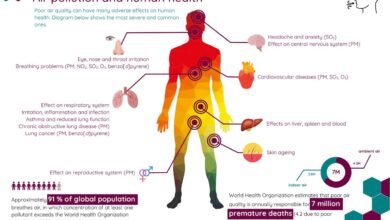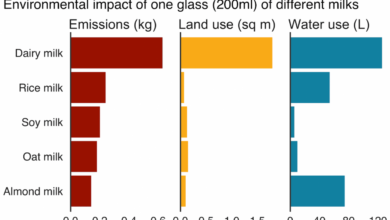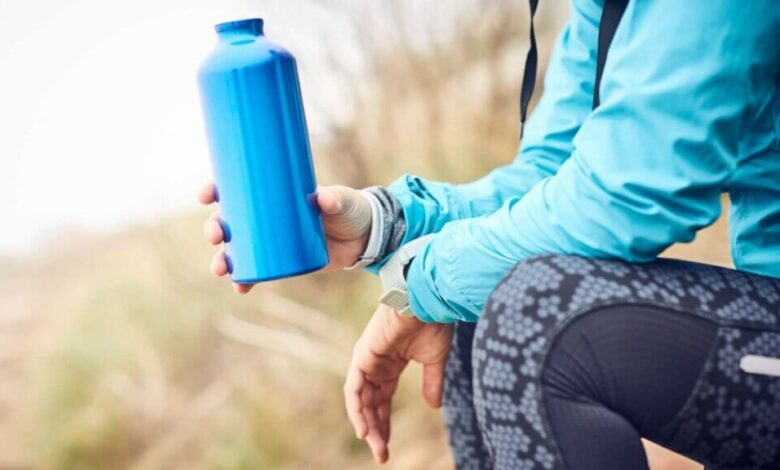
Why You Should Ditch Disposable Water Bottles for Good
Why You Should Ditch Disposable Water Bottles for Good? It’s a question that should be on everyone’s mind. The ubiquitous plastic water bottle, a seemingly harmless convenience, has become a major environmental and health concern. From the plastic pollution choking our oceans to the harmful chemicals leaching into our drinks, the consequences of our disposable habits are becoming increasingly apparent.
But fear not, there’s a simple, sustainable solution: ditching disposable water bottles and embracing reusable alternatives.
The transition to reusable water bottles isn’t just good for the planet, it’s good for your wallet and your health. By making this switch, you can reduce your environmental footprint, save money on bottled water purchases, and eliminate potential health risks associated with disposable plastics.
It’s a win-win for everyone, and it’s easier than you might think.
Environmental Impact
The alarming rise in plastic pollution is a pressing global concern, and disposable water bottles are a significant contributor to this environmental crisis. These seemingly innocuous plastic containers have a detrimental impact on our planet, leaving a lasting legacy of pollution and ecological damage.
Plastic Pollution and its Effects
The widespread use of disposable water bottles has resulted in an overwhelming amount of plastic waste accumulating in our environment. Plastic bottles are designed for single-use, meaning they are often discarded after a single use, ending up in landfills, oceans, and other ecosystems.
- Ocean Contamination:Plastic bottles are often found in oceans, where they break down into microplastics. These tiny plastic particles are ingested by marine animals, causing entanglement, suffocation, and starvation. Microplastics also enter the food chain, potentially posing health risks to humans.
- Wildlife Endangerment:Plastic bottles pose a serious threat to wildlife. Animals can become entangled in plastic rings or choke on plastic debris. Marine animals, such as sea turtles, can mistake plastic bags for jellyfish and consume them, leading to internal injuries and death.
- Landfill Accumulation:Landfills are overflowing with plastic bottles, which take hundreds of years to decompose. This contributes to soil and water contamination, and the production of harmful greenhouse gases.
Environmental Benefits of Ditching Disposable Water Bottles
Switching to reusable water bottles can significantly reduce our plastic footprint and contribute to a healthier planet. By choosing reusable alternatives, we can reduce plastic production, minimize waste, and lower our carbon emissions.
- Reduced Plastic Production:The production of plastic bottles requires vast amounts of fossil fuels, contributing to greenhouse gas emissions. By using reusable water bottles, we can significantly reduce the demand for new plastic production, conserving resources and lowering our environmental impact.
- Decreased Carbon Emissions:The transportation and disposal of plastic bottles also generate significant carbon emissions. Choosing reusable bottles eliminates the need for frequent transportation and disposal, leading to a reduction in our carbon footprint.
- Minimized Waste:Reusable water bottles are designed for repeated use, significantly reducing the amount of plastic waste generated. This helps to alleviate the burden on landfills and prevent plastic pollution from entering our oceans and ecosystems.
The Staggering Amount of Plastic Water Bottles
The global consumption of plastic water bottles is staggering. According to the Environmental Protection Agency, Americans alone use over 50 billion plastic water bottles annually. This equates to approximately 1,500 bottles per second, with only a small percentage being recycled.
The sheer volume of plastic waste generated from disposable water bottles is a major environmental concern.
Health Concerns
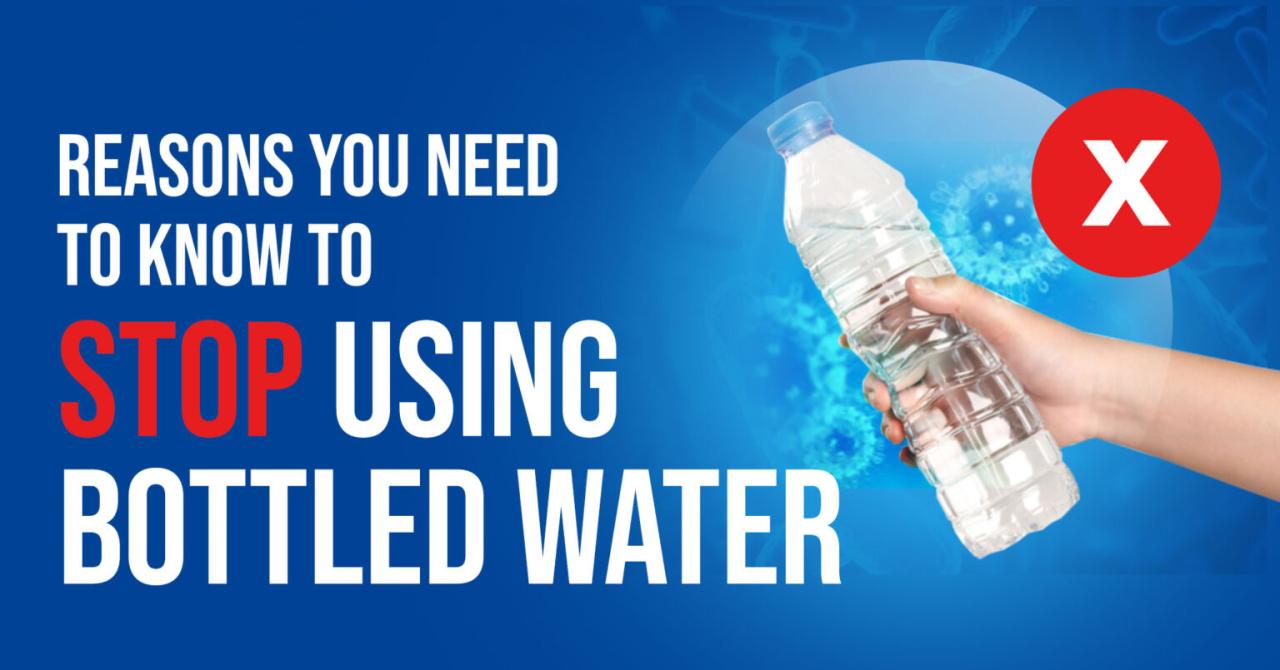
While ditching disposable water bottles is a great step for the environment, it also brings significant health benefits. Choosing reusable alternatives can help you avoid potentially harmful chemicals and promote a healthier lifestyle.
Leaching of Harmful Chemicals
Disposable water bottles, primarily made from polyethylene terephthalate (PET) plastic, can contain harmful chemicals that leach into the water over time, especially when exposed to heat or sunlight.
- Bisphenol A (BPA): This chemical, commonly used in the production of plastics, has been linked to a range of health issues, including endocrine disruption, reproductive problems, and an increased risk of certain cancers. While many manufacturers now claim to use BPA-free plastics, there is evidence that other potentially harmful chemicals, such as BPS (Bisphenol S) and BPF (Bisphenol F), can still leach from these alternatives.
Let’s face it, ditching disposable water bottles is a no-brainer for the planet. Not only does it reduce plastic waste, but it also encourages you to stay hydrated throughout the day. And what better way to stay active and motivated than by setting goals for yourself, like walking for a specific time or distance, using a helpful resource like walk for time or distance.
Plus, carrying a reusable bottle is a reminder to stay on track with your hydration goals, which can be a great motivator to get moving. So ditch the disposables and grab a reusable bottle – your body and the planet will thank you!
- Phthalates: These chemicals are often used to make plastics more flexible and durable. They have been linked to reproductive problems, developmental issues, and even obesity.
Bacteria Growth in Reusable Bottles, Why you should ditch disposable water bottles for good
While reusable bottles are generally considered safer than disposable ones, they can become breeding grounds for bacteria if not cleaned properly.
- Moisture and Warmth: Moisture trapped inside the bottle, especially after repeated use, provides a perfect environment for bacteria to thrive. Additionally, leaving a bottle in a warm environment, such as a car, can further accelerate bacterial growth.
- Improper Cleaning: Simply rinsing a reusable bottle with water is not enough to remove all bacteria. Thorough cleaning with hot, soapy water, or using a bottle brush to reach hard-to-clean areas, is essential to prevent the buildup of bacteria.
Ditching disposable water bottles isn’t just about saving the planet; it’s about protecting your gut health too. These plastic bottles often leach chemicals into your water, disrupting the delicate balance of bacteria in your gut, which is crucial for digestion, immunity, and overall well-being.
Learn more about the importance of gut health and how it impacts your health. So, opt for a reusable bottle and give your gut the healthy hydration it deserves.
Reusable vs. Disposable: A Comparison
While reusable bottles can harbor bacteria if not cleaned properly, the potential health risks associated with drinking from disposable plastic bottles are more significant due to the leaching of harmful chemicals.
- Reusable Bottles: When properly cleaned, reusable bottles offer a safe and healthy alternative to disposable plastic bottles. They are generally made from materials like stainless steel, glass, or BPA-free plastics, which are less likely to leach harmful chemicals into your water.
- Disposable Bottles: The leaching of harmful chemicals from disposable plastic bottles, as discussed earlier, poses a significant health risk, especially with repeated use and exposure to heat or sunlight. The potential for bacterial growth in these bottles is also a concern, although generally less significant than in reusable bottles due to their single-use nature.
Economic Advantages: Why You Should Ditch Disposable Water Bottles For Good
Switching to reusable water bottles is not just good for the environment; it’s also good for your wallet. By making this simple change, you can significantly reduce your spending on bottled water, which can add up over time.
Cost Comparison
The cost difference between disposable and reusable water bottles becomes apparent when you consider the long-term impact. While reusable bottles might have a higher initial purchase price, they offer substantial savings in the long run. Here’s a breakdown:
- Disposable Bottles:The average price of a single disposable water bottle is around $1. If you consume one bottle per day, that translates to $365 per year. This cost can vary depending on your location and the type of bottle you purchase.
Ditching disposable water bottles is a small step with a big impact on the planet. It’s also a great way to encourage healthier habits. Instead of grabbing a plastic bottle, I love to pack a reusable one filled with ice-cold water and pair it with a delicious and nutritious meal like shrimp fried quinoa with egg whites.
This simple swap helps reduce waste and keeps you hydrated and energized for all your daily adventures.
- Reusable Bottles:A good quality reusable water bottle can cost anywhere from $10 to $50. However, you can refill it countless times, eliminating the recurring cost of buying disposable bottles. This means you’ll only need to spend money on the initial purchase, making it a much more cost-effective solution.
The cost savings from using a reusable bottle can be significant, especially if you consume bottled water regularly.
Lifestyle Changes
Ditching disposable water bottles requires a shift in mindset and some practical adjustments to your daily routine. It’s about making conscious choices that prioritize sustainability and health.
Transitioning to Reusable Bottles
The transition to reusable water bottles is easier than you might think. It’s about planning ahead, carrying your bottle, and refilling regularly. Here’s how to make the switch:
- Plan Ahead:Start by investing in a high-quality reusable water bottle. Choose one that’s durable, leak-proof, and easy to clean.
- Carry Your Bottle:Make it a habit to carry your reusable bottle with you everywhere you go. Keep it in your bag, your car, or on your desk at work.
- Refill Regularly:Make sure you refill your bottle throughout the day. Look for water fountains, cafes, or restaurants that allow refills.
Inspirational Examples
Many individuals have successfully transitioned to reusable water bottles, proving that it’s achievable. For instance, Sarah, a busy working mom, found that carrying a reusable bottle helped her stay hydrated throughout the day and reduced her reliance on single-use plastic.
Similarly, John, an avid hiker, realized that using a reusable bottle significantly reduced his environmental footprint while exploring the great outdoors.
Integrating Reusable Bottles into Daily Routines
Integrating reusable water bottles into your daily routine requires a bit of planning and effort. Here are some tips to make the transition smoother:
- Start Small:Begin by using your reusable bottle at home or during short trips. Gradually expand its use to other situations.
- Set Reminders:Use your phone’s calendar or a reminder app to prompt yourself to refill your bottle throughout the day.
- Find Convenient Refill Locations:Identify water fountains, cafes, or restaurants that allow refills. This will make it easier to stay hydrated while using your reusable bottle.
- Pack Your Bottle:Always pack your reusable bottle in your bag or backpack, especially when you’re on the go.
- Make it Visible:Place your reusable bottle in a visible location, such as your desk or kitchen counter, to remind yourself to use it.
Final Thoughts
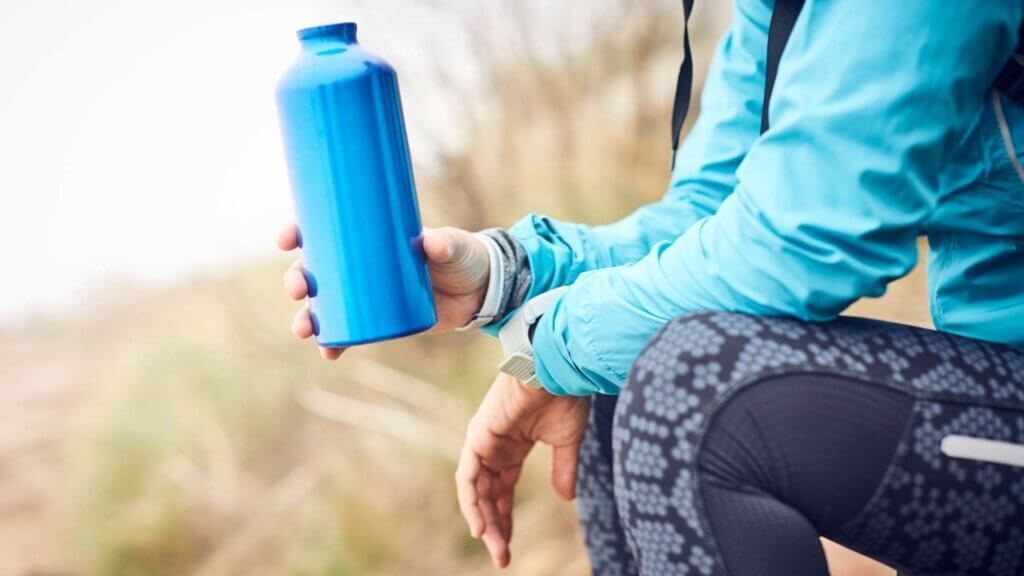
In a world grappling with environmental challenges and health concerns, choosing reusable water bottles is a small but significant step towards a more sustainable and healthy future. It’s a simple change that can make a big difference. So, ditch the disposables, embrace the reusable, and join the growing movement towards a greener, healthier tomorrow.
Your planet and your health will thank you for it.

